The Catholic Church. The repression goes on.
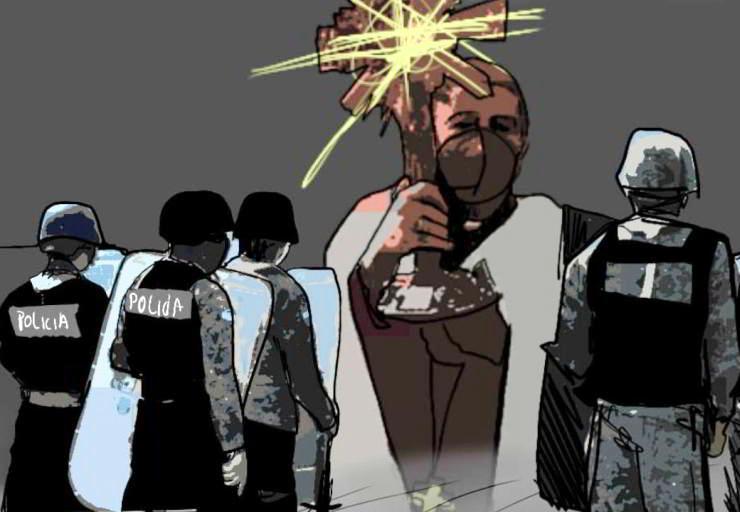
A ferocious campaign against the Catholic Church. Priests imprisoned and tortured. Bishops, priests and religious expelled. Nationality revoked. Christian communities deprived of their popular devotions.
On Sunday afternoon, our meeting place is the Plaza Inter shopping centre, in the food court near the Hugo Chávez roundabout, in the centre of Managua. I see him arrive, he looks around and walks with his head down. He is young. He has only been a priest for a few years. His parish is not far from the capital. He sits down, but continues to look around. “We are afraid. We are followed everywhere. Our homilies are recorded and our phones are tapped. At any moment we can be stopped and arrested,” he says as if to apologize.
The young priest tells a sad story: “I was not yet a priest when it happened. I will never forget that day: it was July 13, 2018. I was in the Church of Divine Mercy, which is located behind the National Autonomous University. The police and paramilitaries attacked the students barricaded inside the university, and some managed to escape by taking refuge in the church. The police and paramilitaries opened fire on the church, the windows were broken and even the tabernacle was pierced by bullets. For twelve hours, fire and bullets rained down on unarmed young students.
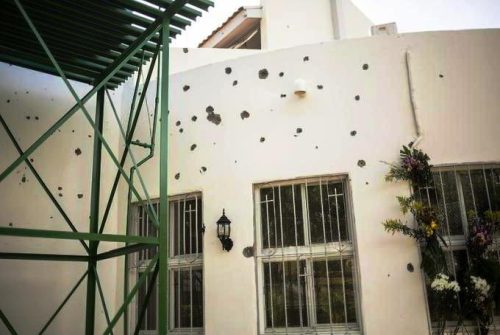
The walls of the Church of Divine Mercy riddled with bullets. At least one student was killed and several were injured. Photo: Social Media
Inside, some of them were crying, others were recording their last messages to their parents, which is what I did too. So much anger towards these kids. Only after the intervention of Cardinal Leopoldo Brenes, Archbishop of Managua, and the nuncio, Waldemar Stanisaw Sommertag, after a long negotiation, did they come to get us. This prevented a massacre.”And he continues: “Some of these kids were later arrested. Others managed to escape and take refuge in Costa Rica.” In the past seven years, the violence of the Ortega government has manifested itself through expulsions, arbitrary arrests, direct attacks on religious leaders, stigmatisations and hate speech against freedom of worship.On March 12, 2022, the Nicaraguan government decided to expel the nuncio, Monsignor Waldemar Stanislaw Sommertag. Nicaragua is the only country in America and the 13th in the World to have frozen relations with the Holy See.
Lawyer Molina Montenegro has documented the systematic attacks on the Catholic Church. The report lists 870 attacks on the Nicaraguan Catholic Church, in its various expressions, between April 2018, when the popular demonstrations began, and 2024. These are facts listed one by one and verified by the author, divided into different categories.
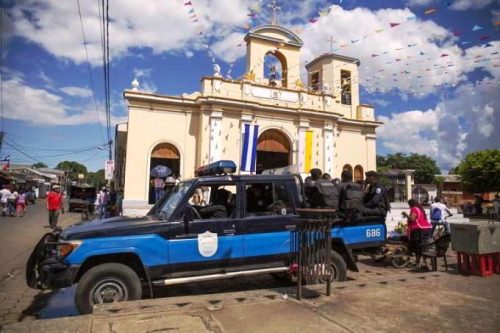
A patrol car with riot police stationed outside the church of San Miguel in Masaya. A systematic attack on the Catholic Church. Photo: Social Media
There were approximately 313 impediments and threats to priests and religious, including arrests, trials and deportations; 219 attacks, “sieges”, and bans on churches and religious structures; 95 thefts and profanations; 91 episodes of threats and repression against lay faithful; 86 hate speeches and messages; 47 closures of mass media or charitable projects and works, with 14 religious congregations having to cease their activities in the country; 19 confiscations of property linked to the Church. Not to mention the 9,688 processions in public spaces prohibited by the police, for example during Holy Week. Sometimes, the rites were held inside churches, and many other times they were cancelled. Since November, the regime has prohibited priests from entering public hospitals to administer the sacrament of the Anointing of the Sick. The young priest comments: “People often look for us at night and ask us to go with them. Those who are dying desperately
ask for a priest.”
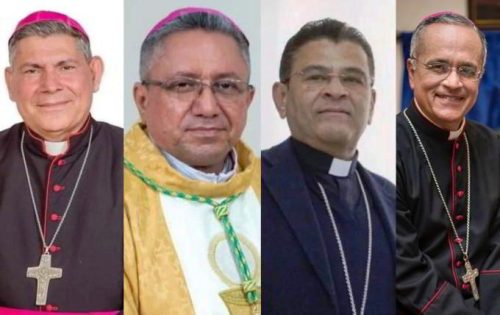
From the left: Mgr. Carlos Enrique Herrera Gutiérrez, bishop of Jinotega and president of the Episcopal Conference of Nicaragua, Mgr. Rolando Álvarez, bishop of Matagalpa, Mgr. Isidoro Mora, bishop of Siuna were expelled from the country. Mgr. Silvio José Báez, auxiliary bishop of Managua, also had to go into exile in 2019. File swm
More than 245 priests, men and women religious have been expelled from the country. Among them are three bishops: Mgr. Carlos Enrique Herrera Gutiérrez, bishop of Jinotega and president of the Episcopal Conference of Nicaragua, Mgr. Rolando Álvarez, bishop of Matagalpa, Mgr. Isidoro Mora, bishop of Siuna. Mgr. Silvio José Báez, auxiliary bishop of Managua, also had to go into exile in 2019.
More than 30 nuns of the order of Santa Clara, known as the Poor Clares, were expelled from Nicaragua on the night between January 28 and 29 of this year. The nuns were taken from their three monasteries in Managua, Matagalpa, 128 kilometres northeast of the capital, and Chinandega, in the northwest of Nicaragua, not far from Honduras.
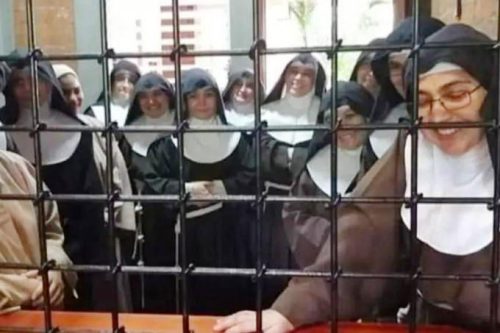
More than 30 nuns of the order of Santa Clara, known as the Poor Clares, were expelled from Nicaragua on the night between January 28 and 29 of this year. Photo: Despacho 55
The diocese most affected was that of Matagalpa, the clergy consisted, before the persecution began, of 71 diocesan and religious priests. Currently, 13 priests are present in Matagalpa, the others have been exiled, and are supported by 9 religious to assist 615,685 baptised faithful, distributed over 6,804 square kilometres.
The real thorn in the side of the regime is Bishop Rolando Álvarez. The Nicaraguan bishop was detained for 17 months in his country, first under house arrest and then in prison, accused by Daniel Ortega’s regime of “conspiracy” and “betrayal of the homeland”, among other crimes, for which he was sentenced to 26 years and four months in prison. After a long negotiation with the Holy See, Bishop Rolando Álvarez was expelled and sent to Rome.
In a recent interview. Msgr. Rolando Álvarez said: “I arrived in Rome below zero, below zero in all my psychological, psychiatric, emotional, affective, sentimental, moral, spiritual, physical and somatic capacities. Now, a year later, I can say that I have recovered 90%”.
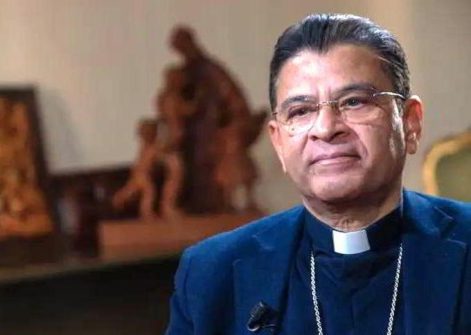
Mgr. Rolando Álvarez, bishop of Matagalpa. “I will continue to be bishop of Matagalpa and apostolic administrator of Estelí as long as God wants it”. Photo: EWTN
And he continues: “In the same week of my arrival I would have resigned from my diocese of Matagalpa and the apostolic administration of Estelí. I was ready to present my resignation to the Pope, but I was welcomed by the goodness of God and the Holy Father who wanted me to continue being the ordinary of Matagalpa and the apostolic administrator of Estelí, even though I was in the diaspora. I do not call it exile because I am not exiled, I am liberated. I do not feel exiled, but liberated. In the diaspora faith always grows and hope is strengthened. I have always believed in my liberation. In prison, I learned two things: it is a mistake to think that a prisoner will never get out, just as it is a mistake for a prisoner to think that he will never get out. What sustained me was prayer, not only mine, but that of all the faithful people of God in Nicaragua and in the world. I love my people deeply. I will continue to be bishop of Matagalpa and apostolic administrator of Estelí as long as God wants it. May the Lord bless all the Nicaraguan people and Latin America!”
I look carefully at this young priest while he is drinking his coffee, and ask what will happen to the priests who are supporting the Ortega-Murillo dictatorship. He raises his head and with a deep gaze says: “We know very well who they are. We will have to arrive at a strong response. Many of our priests have been in prison and have been tortured while they ate and drank with those who decided to torture the priests. There is justice that is not only divine. We will have to arrive at a showdown. There can never be forgiveness or reconciliation without justice. And I am waiting for that day.” (Photo: Expediente Publico/Youtube)
Nohemy Ana Rocha



